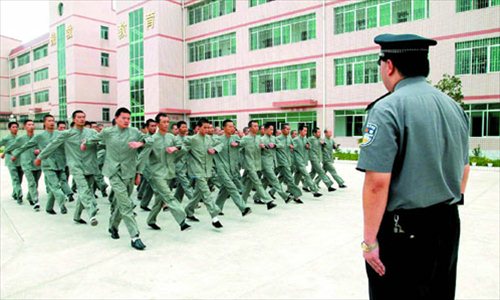Petition calls for end to labor re-education

File photo: A re-education through labor center in Guizhou Province. Photo: Southcn.com
More than 7,000 people have signed an appeal calling for the abolishment of the country's re-education through labor system, which drew public ire after a recent series of controversial cases.
Wang Cheng, a Hangzhou-based lawyer who initiated the campaign on August 10, said the appeal will be submitted to China's top legislature once 10,000 people have signed, either through Weibo, e-mail or mobile phone.
The re-education through labor system violates China's Constitution and has led to serious injustices including instances of abuse of power by police officers and infringements upon human rights, Wang told the Global Times.
"The system doesn't fit in with social development," said Wang, adding that some local officials have exploited the practice to suppress petitioners and residents who lodged complaints, which has led to societal tensions and the erosion of government credibility.
By posting proposals on Weibo, Wang had rallied 7,100 signatures by late Tuesday, including those of renowned writer Zheng Yuanjie, former real estate boss Ren Zhiqiang and IT celebrity Li Kaifu, as well as people who had been through re-education and their families.
However, it drew other kinds of attention as well. Wang said his Weibo account was inaccessible for a while when he first posted the proposal in August, and local police in Hangzhou paid him a visit. "They said they agree with me on the issue to some extent, but would prefer me doing this through other more 'rational' ways," Wang said.
Established in 1957, the re-education through labor policy was designed to "maintain social security, rehabilitate offenders and act as a crime deterrent." It is used as an administrative punishment in cases that are not considered as serious as a crime, or in relation to minor offenses that do not require a criminal charge. The punishment ranges from one to four years.
The policy has remained controversial for decades and became the center of public debate recently after the case of Tang Hui, the mother of an underaged rape victim, who was sent to a re-education through labor center in Hunan Province in August for "disturbing social order." Tang had protested in front of the local government of Yongzhou and accused the local police of helping the rapists who forced her daughter into prostitution.
The online call for signatures is merely one aspect of the massive wave of protest which has been reverberating throughout China.
On August 14, 10 lawyers from across the country submitted a letter to the Ministry of Public Security and Ministry of Justice, urging the two ministries to reform the laws.
The letter stated that on some occasions, the practice is illegally used on detainees after secret decisions, for arbitrary periods of times, and there is no age limit on people being sent to labor camps.
Although some experts agree the policy did have an effect in terms of educating and dissuading many from committing serious crimes, its defects have led many to call for the removal of the policy, or at least significant reform.
The standing committee of the National People's Congress proposed new laws in 2005 and 2010 respectively, which would replace the re-education policy, with stipulations requiring labor camp detainees be subject to standard legal procedures and shorter sentences.
However, law experts said that the proposals foundered after public security authorities raised objections.
Aspects of the proposed laws have been trialed in several cities such as Nanjing and Zhengzhou, according to a Caixin report. However, that does not necessarily indicate they are part of a national reform measure or a removal of the policy, said Li Fangping, a Beijing-based human rights lawyer who signed the protest and the letter to the two ministries.
"I'm still optimistic. Some unnamed officials within the labor camps also wrote to me to voice their support," Wang said.
"Public efforts, including public appeals and calls from experts might push the government to take on reform sooner," Wang added.